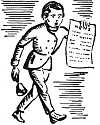|
A Radio Talk by Charles F. Kettering  There is a scene in the story, "A Christmas Carol," in which Ebenezer
Scrooge leans out of his window on Christmas Day and calls to a small
boy in the street to get him a turkey. If Scrooge had looked a little
further down the street, he probably would have seen another small boy,
a newsboy.
There is a scene in the story, "A Christmas Carol," in which Ebenezer
Scrooge leans out of his window on Christmas Day and calls to a small
boy in the street to get him a turkey. If Scrooge had looked a little
further down the street, he probably would have seen another small boy,
a newsboy. When a boy delivered a paper in those days, he gave the paper to his customer and waited patiently outside while the customer read it. You see, the boy had only one paper. In the early 19th Century following the upheaval in Europe times were very turbulent. Technical progress had almost been stopped. Scientists were often exiled and sometimes beheaded because they did some original thinking. That is why we want to tell the story of a newsboy of this period, Michael Faraday, who, despite the handicaps of the period, developed the principles of modern research. Faraday's father was a blacksmith and, when the boy was five, the Faradays moved to rooms over a coach-house in London. The family was quite poor, and at an early age Michael had to help earn his living. |








